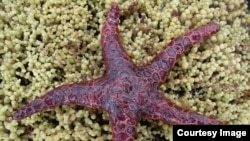Marine life is reacting to global climate change faster than land-dwelling species, according to a new three year study published in the journal, Nature Climate Change.
The researchers said their findings show that the distribution of marine life is being re-arranged as the oceans get warmer. The research team includes 19 scientists from Australia, the United States, Canada, Britain, Europe and South Africa.
According to the scientists, marine species are escaping the warming waters by heading toward the Earth’s polar regions at a rate of up to 72 kilometers per decade. That compares to land-based species that are moving toward the poles at an average of six kilometers per decade.
“We found that, on average, marine organisms are moving three to 10 times faster than land-based organisms,” said David Schoeman, a member of the research team from the University of the Sunshine Coast in Australia. “They are moving at a rate of 30-72 kilometers per decade, compared with estimates of 6-16 kilometers per decade for land-based species.”
One of the study‘s two leaders, Dr. Elvira Poloczanska from Australia’s Commonwealth Scientific and Industrial Research Organization, said that winter and spring temperatures, over both the ocean and land, are warming fastest and that this could alter the rhythm of events such as feeding and the timing of marine life reproduction and migration.
She also points out that the ocean’s absorption of carbon dioxide produced by humans is changing the chemistry of seawater, which can impact some marine organisms.
"Given these findings, we expect marine organisms to have responded to recent climate change with magnitudes similar to or greater than those found for terrestrial species," Poloczanska said.
Even breeding cycles affected
Anthony Richardson, the study’s other leader, explained that the timing of marine life breeding is taking place, on average, 4.4 days earlier each decade, which is also much faster than land based species that are breeding around 2.3 to 2.8 days earlier each decade.
Among the marine species that have been showing the greatest reaction to the warming ocean environment, according to the researchers, are phytoplankton, zooplankton, and bony fish.
To reach their findings, the researchers built a large database that noted 1,735 changes in marine life. The information for the database was taken from peer-reviewed literature from around the world that was based on observations made over an average of 40 years.
The researchers said their work is different from similar studies that were done in the past because those studies relied on terrestrial data to estimate the impact of on marine life.
"This is the first comprehensive documentation of what is happening in our marine systems in relation to climate change," said Camille Parmesan, a member of the research team who is with the National Center for Ecological Analysis and Synthesis in California. "What it reveals is that the changes occurring on land are being matched by the oceans. And far from being a buffer and displaying more minor changes, what we're seeing is a far stronger response from the oceans."
The researchers said their findings show that the distribution of marine life is being re-arranged as the oceans get warmer. The research team includes 19 scientists from Australia, the United States, Canada, Britain, Europe and South Africa.
According to the scientists, marine species are escaping the warming waters by heading toward the Earth’s polar regions at a rate of up to 72 kilometers per decade. That compares to land-based species that are moving toward the poles at an average of six kilometers per decade.
“We found that, on average, marine organisms are moving three to 10 times faster than land-based organisms,” said David Schoeman, a member of the research team from the University of the Sunshine Coast in Australia. “They are moving at a rate of 30-72 kilometers per decade, compared with estimates of 6-16 kilometers per decade for land-based species.”
One of the study‘s two leaders, Dr. Elvira Poloczanska from Australia’s Commonwealth Scientific and Industrial Research Organization, said that winter and spring temperatures, over both the ocean and land, are warming fastest and that this could alter the rhythm of events such as feeding and the timing of marine life reproduction and migration.
She also points out that the ocean’s absorption of carbon dioxide produced by humans is changing the chemistry of seawater, which can impact some marine organisms.
"Given these findings, we expect marine organisms to have responded to recent climate change with magnitudes similar to or greater than those found for terrestrial species," Poloczanska said.
Even breeding cycles affected
Anthony Richardson, the study’s other leader, explained that the timing of marine life breeding is taking place, on average, 4.4 days earlier each decade, which is also much faster than land based species that are breeding around 2.3 to 2.8 days earlier each decade.
Among the marine species that have been showing the greatest reaction to the warming ocean environment, according to the researchers, are phytoplankton, zooplankton, and bony fish.
To reach their findings, the researchers built a large database that noted 1,735 changes in marine life. The information for the database was taken from peer-reviewed literature from around the world that was based on observations made over an average of 40 years.
The researchers said their work is different from similar studies that were done in the past because those studies relied on terrestrial data to estimate the impact of on marine life.
"This is the first comprehensive documentation of what is happening in our marine systems in relation to climate change," said Camille Parmesan, a member of the research team who is with the National Center for Ecological Analysis and Synthesis in California. "What it reveals is that the changes occurring on land are being matched by the oceans. And far from being a buffer and displaying more minor changes, what we're seeing is a far stronger response from the oceans."











